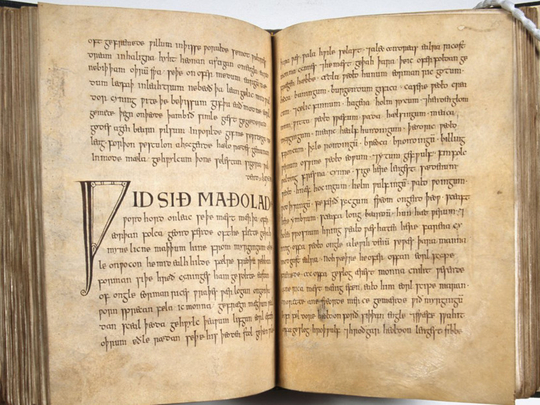
The Exeter Book, an Anglo-Saxon poetry anthology dating back more than 1,000 years, which has inspired writers from WH Auden to JRR Tolkien, has been granted Unesco status as “the foundation volume of English literature”.
Housed in Exeter Cathedral since it was given to the institution by its first bishop, Leofric, in the 11th century, the Exeter Book was written around 970. It contains some 40 poems and 96 riddles, a number of which are found nowhere else. On Tuesday, it was placed on Unesco’s Memory of the World register, where it will sit alongside works such as the Magna Carta, the Bayeux Tapestry, the Book of Kells and the Diary of Anne Frank.
“It is one of only four surviving major poetic manuscripts in [the Old English] vernacular,” said Unesco. “Since it is the largest and probably the oldest of them, and since its contents are not found in any other manuscript, it can claim to be the foundation volume of English literature, one of the world’s principal cultural artefacts.”
Exeter University professor Emma Cayley said the story of the Exeter Book was one of “miraculous survival; it has been really used and abused in its 10 centuries of life, and was not always as prized as it is now.”
The book, she said, “is an irreplaceable foundation of English literature, which is why Auden and Ezra Pound and Tolkien were inspired by it”.
Poems in the book include The Wanderer, which inspired Auden’s poem of the same name. There is also The Seafarer, which inspired Ezra Pound, as well as some of the only poetry from that period written in the voices of women. The book also includes the poem Christ I, from which the lines “Eala Earendel engla beorhtast / Ofer middangeard monnum sended” (translated as “Hail Earendel brightest of angels / over Middle Earth sent to men”), inspired Tolkien’s creation of Middle-earth and his character Earendil.
Its riddles, meanwhile, run from the everyday to the ribald.
“There are a few obscene riddles - things which essentially have naughty meanings and clean meanings,” said Cayley, who is developing an app to make the book accessible to the public.
Exeter Cathedral’s canon librarian Ann Barwood said it was only in the 19th century that the book “began to receive the attention it had deserved for centuries”. Cayley added that it was still little known today.
“The people who look after the book and work on it - the scholarly community - are totally aware of the book’s significance. But I’m pretty sure if you asked the general public about the Exeter Book, nobody would have heard of it,” she said. “If you asked them about the Diary of Anne Frank, or the Magna Carta, or the Bayeux Tapestry, they would have heard of them - and all those things are also listed on the Memory of the World register.”
The Unesco programme is intended to recognise documentary heritage deemed by experts to be of “outstanding significance” to the UK.
“Poetic manuscripts in Old English are extremely rare - only four survive in the world - and the Exeter Book is the most varied, the best preserved and probably the oldest of them,” said cathedral librarian Peter Thomas. “It is the foundation volume not only of the cathedral library but also arguably of English literature itself, one of the major contributions to world culture.”
— Guardian News & Media Ltd.








